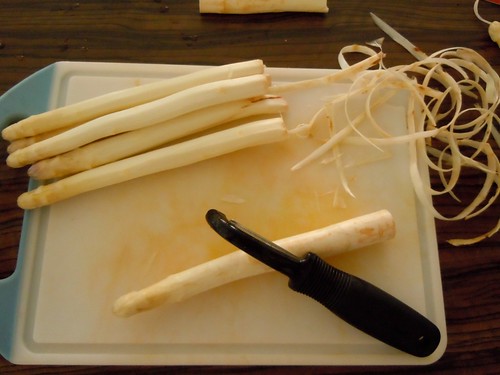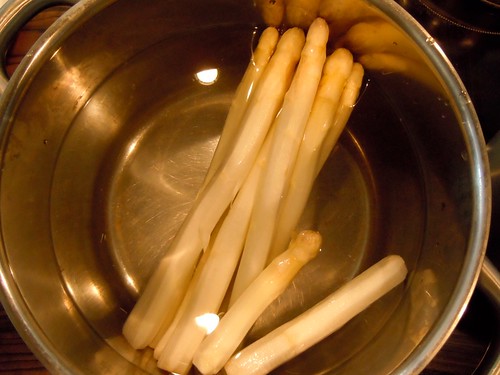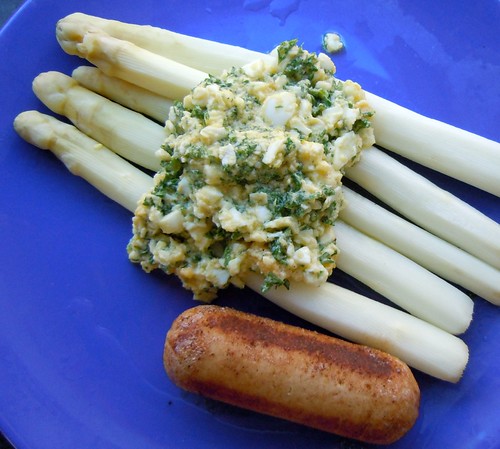First off, I am in love with the Belgian cooking show Dagelijkse Kost. In love! The online videos are useful in language learning, it focuses heavily on Belgian sourced ingredients, and the recipes are a great way to learn more about modernized Belgian cuisine. Take for instance, asperges op Vlaamse wijze, white asparagus lightly poached then topped with a parsley-egg-butter sauce. The show has weekly menus accompanied with videos, recipes, shopping tips, and price estimates.
My friend, Nico, was impressed with my ability to understand Chef Jeroen Meus's Leuvense dialect, but this is precisely the kind of Dutch I'm learning. I attempt to speak Belgian Dutch - er - Flemish. Plus, 3 minute video segments on cooking are perfect. The context is largely understandable, I can hear and listen to the way the ingredients and methods are supposed to sound like (trust me onion, ui, felt like a god-awful tongue twister).
One quick thing on dialects. While all Belgian Flemish schoolchildren learn standard Dutch/Nederlands, one will find that dialects are the form of spoken language. They vary from town to town, and by region. So, if you are from West Flanders the dialect there (although they still speak Dutch/Flemish) tends to skip a lot of sounds, and if you are from Limburg, you tend to make the rolling "rrrr" sound in the back of your throat, but somehow not a guttural "rrrrr." Whereas in Leuven, it's a mixture of geographical placement (being so close to Brussels) that the Flemish in a way sounds like a cross between the soft intonations of French together with an English person speaking very softly (totally not accurate). It has a wave-like rhythm, and I do realize, I'm beating this whole thing into the ground, but basically as a language learner, I'm learning standard proper Dutch at the university, but no one understands me here - and I'm sure if I were placed in Holland, no one would understand me there either. I speak most efficiently among other non-native language learners, and if you try speaking Flemish/Dutch with locals they'll often have difficulty understanding you, realize you are a foreigner, and automatically switch to English. This is frustrating to language learners, but is truly a Belgian Flemish trait. They never expect you to fully converse, always appreciate the attempt to speak, and because they know and speak English completely fluently, will do this to accommodate you.
Anyways, learning the language here has been fun. I've just completed exams for Level 2, and feel like I've gotten everything I wanted out of the courses. I'm able to make simple appointments or requests over the phone, can buy international tickets at the train station, and with a little help of cooking shows, can now pronounce most of the fruits and vegetables I buy at the city markets.
I made this recipe from Dagelijkse Kost, a cooking show on the Belgian TV channel Eén. I won't lie, I had to watch the video several times, and maybe hit Google Translate once. Enjoy or as they say here, eet smakelijk!
Asperges op Vlaamse wijze
Flemish-style Asparagus
Serves 2
Ingredients:
1 dozen or more fresh white asparagus
3 eggs, hard-boiled (1 tsp vinegar if hard boiling them)
1/2 cup chopped curly parsley
salt and pepper to taste
fresh nutmeg (probably less than 1/8 tsp)
1/2 cup butter or 100 g butter
Directions
- Add the eggs, vinegar, and enough water to a small saucepan. Bring it to a light boil and cook the eggs 10 minutes. Add the eggs to a cold water bath to cool. Peel when cool enough to handle.
- Lightly wash the asparagus and set aside. Take a vegetable peeler, and while holding the tip, peel all the way around.
- Set the peeled asparagus in a pot filled with cold lightly-salted water. Heat the pot over medium, being careful not to boil. Once the water simmers, turn it off, and let the asparagus sit in the warm water for 5-10 minutes. Then set the asparagus on a plate until ready to use.
- Place the butter in a small saucepan, and heat it until it simmers. You'll be clarifying the butter, so skim off the white milk solids on the top and set aside. Meanwhile, peel the eggs.
- Mash the eggs coarsely with a potato masher. Add in parsley, butter, salt and pepper, and nutmeg. If too thick add in a 1-2 tbsp of water until the sauce has a nice consistency.
- Set the asparagus on plates and top each with half of the sauce.
Since I served this for dinner, I used up the discarded buttery milk solids by frying up some veggie sausages, and although definitely not part of the cuisine, it rounded out the dish nicely.
Eet smakelijk!






Hey, I had this EXACT thing at a restaurant the other night! Seriously, it looked exactly like yours! I loved the asparagus, but the eggs were a bit too salty for me.
ReplyDeleteAh, I will always struggle with dialects, the bane of my Flemish existence. My family in law is difficult to understand because of all the dialects that are being flung around.
It always bothers me when people switch to English here - to me, it feels unaccommodating sometimes, like they're just too impatient to deal with my Dutch. That doesn't happen as much anymore, but when I first arrived that drove me crazy! I've noticed that at the state-house and cultural center they don't do this - even in the beginning they didn't. I think they've been actively prepped/taught to encourage people in their attempts at Dutch. I wish other offices would follow suit!
(Longest comment ever. I could go on for hours. But I won't.)
You're totally right about the state-house, and yes, we're always like geen Engels (but really, I think it's the accommodating nature and not impatience), oh and I passed Niveau 2!
ReplyDeleteI am so impressed with your language skills! I think the only way I would really get into learning another language is through food because I can fully embrace the language through all senses and hopefully remember words and context better. Love that you're picking words up from cooking shows :o)
ReplyDeleteThanks Stephanie!
ReplyDelete